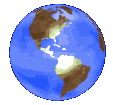
World Civilization
1550 to the present
World Civilization Interactive Journey
HIST 4130/5130
The Middle Ages
HIST 4950/5950
Medieval Monasticism
HIST 4140/5140
Renaissance and
Reformation
HIST 4280/5280:
Intellectual and
Cultural History
of Europe
to 1500 C.E.
HIST 4285/5285:
Intellectual and
Cultural History
of Europe
since 1500 C.E.
IDST 2310:
The Fine and
Applied Arts
in Civilization
Databases, Bibliographies,
and other WWW
Research Resources
Georgia College &
State University

Byzantium
OBJECTIVES: 1. Be able to discuss the reasons why the eastern empire survived while the western empire collapsed. 2. Be able to discuss the achievements of the emperor Justinian and his reconquest of the west. 3. Be able to discuss the legacy of Roman law as seen in the Corpus Juris Civilis. 4. Be able to discuss the conflict between east and west during the crusades. 5. Be able to discuss the events which led to the crusades and the lasting legacy on relations between east and west.
FOOD FOR THOUGHT: What were the issues which separated the eastern Christian from the western Christian? What might have been done, if anything, to resolve these conflicts? Consider the Crusades and the enmity between east and west which resulted from them. Why weren't the east and west able to successfully join forces against the common enemy? In light of your reflections on the first two questions, do you believe that "Christendom" is a fair way to describe the community of Christians in the Middle Ages? The Byzantine Empire preserved the imperial grandeur of ancient Rome until 1453, when Constantinople fell to the Turks. 1453 was the end of an era, the end of an empire which had begun in 509 b.c. It also marked the end of the Christian domination of the Holy Land and the solidification of muslim power in the east. Moreover, the struggle against the infidel had forever separated eastern Christendom from western Christendom. While Byzantium survived, it was the symbol of the glories of hellenic culture. Even women were educated well enough in the east that Anna Comnena could quote Homer by memory and berate the westerners for their barbarity. Christianity had in fact spread from the east. The aura of holy men such as St. Simeon Stylytes still lingered in the east, where religious issues could result in brutal bloodbaths in the streets of Constantinople. When the end came in 1453, many Greek speaking scholars fled to Venice, where they fueled the Italian Renaissance. Greek culture thus lived on in the minds of the west. ironically through fusion with the culture so many easterners had for so long detested. Many religious people are deeply suspicious. They seem -- for purely religious purposes, of course -- to know more about iniquity than the unregenerate. Kipling, Plain Tales from the Hills. Watches of the Night.
OUTLINE I. The Collapse of the West II. The Reign of Justinian (527-565 a.d.) a. Belisarius and the reconquest of the west b. the Corpus Juris Civilis the legacy of Roman Law III. Later Byzantium: A. Politics: i. the role of the emperor: "the thirteenth apostle" ii. the theme system and the military iii. the bureaucracy B. The schism with the Latin (Roman Catholic) Church the issues C. The Crusades i. the expansion of Islam and the Battle of Manzikert 1071 ii. to the west for help: a. the emperor Alexis his daughter Anna Comnena the attitude toward the west b. the Peasants' Crusade: Peter the Hermit the destruction of the byzantine countryside their fate c. the "official crusade" the western princes the Latin States the violation of the pact with Alexis iii. the second and third crusades Philip of France Richard the Lionhearted Frederick Barbarosa his death iv. the fourth crusade the conquest of Constantinople in 1204 Christian against Christian v. legacy of the crusades: a. conflict between east and west b. the new knowledge channeled to the west as a result of the crusades